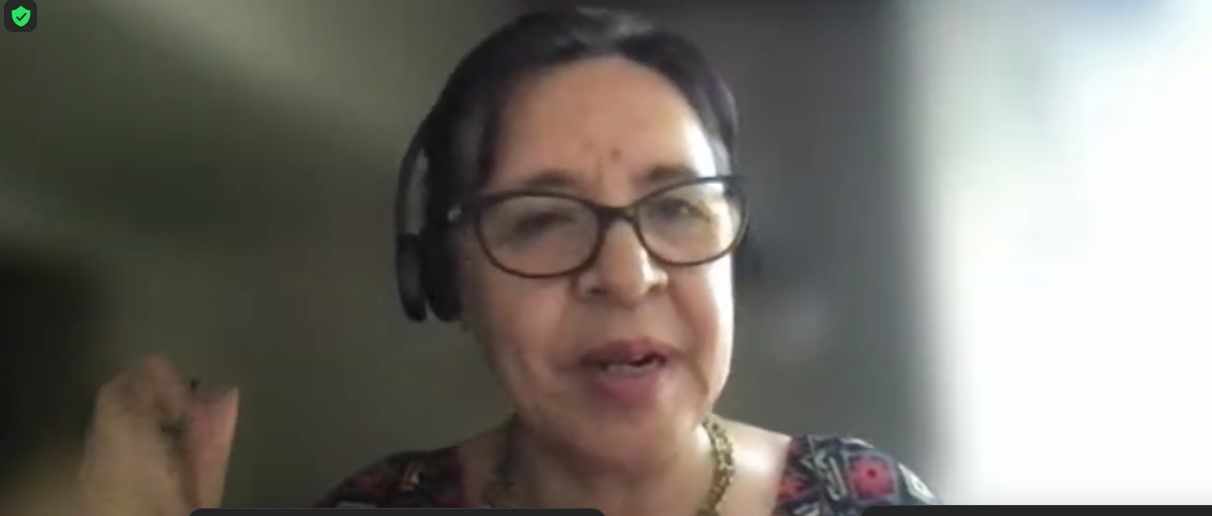
Moema Miranda, a member of the Secular Franciscan Order, speaks at a Dec. 14 webinar "Unpacking the Illusions of the Green Economy in the Energy Transition," hosted by the Justice, Peace and Integrity of Creation (JPIC) Commission. (GSR screenshot)
Not all green practices fully benefit the environment. In fact, some cause devastating effects on nature and humans, alike.
This dilemma served as the focal point of a Dec. 14 webinar "Unpacking the Illusions of the Green Economy in the Energy Transition," hosted by the Justice, Peace and Integrity of Creation (JPIC) Commission. Jointly established by the International Union of Superiors General-Union of Superiors General, the commission aims to integrate contemplation and action in order to help transform the world.
The event's expert speakers addressed some troubling consequences of the global transition from fossil fuels to renewable energy, especially in regard to mining efforts. To overcome these issues, they advocated for chartering a different path forward, promoting a new global paradigm for responsible green efforts.
"We shouldn't lose heart," said Martha Inés Romero, secretary general of Pax Christi International, the global Catholic movement for peace and nonviolence. "It's important to stress we can be sowers of change."
The most dire issues stemming from green practices include harmful mining around the world, said Sr. Maamalifar Poreku, a Missionary Sister of Our Lady of Africa and executive co-secretary of the JPIC Commission.
Mining for lithium — a key manufacturing material for solar panels and electric car batteries — can lead to air and water pollution, as well as a variety of negative impacts on nearby communities.
"(This) is causing significant social and environmental impacts," Poreku said, underscoring the importance of stopping those "who want to take advantage of the climate crisis to enrich themselves at the expense of the poor and nature."
'True sustainability requires reevaluating our economic model and reevaluating the capitalist system.'
—Br. Rodrigo Peret
Some strategies for addressing climate change also support existing colonial structures that "exacerbate historical inequalities" and promote the "expansion of corporate power over territories" worldwide, said Franciscan Br. Rodrigo Peret, a civil engineer who has worked with communities affected by mining conflicts for over a decade.
"True sustainability requires reevaluating our economic model and reevaluating the capitalist system," Peret said.
Ramón Balcázar, a PhD researcher on lithium extractivism (the removal of large quantities of natural materials) in Chile, discussed how that country experiences many such concerns.
As Chile is the world's second-highest producer of lithium, he said, this creates an unreliable economic dependence on the mining industry.
"There are supercycles of prices and quantity, and these generate a lack of stability in [Chile's] economy," said Balcázar, also a specialist in agroecology extractivism and socioecological transition.
Lithium mining also occurs on the lands of Chile's Indigenous people and impacts their way of life, he noted. And some mining practices (such as extracting lithium from brine water through an evaporation process), exacerbate water shortages for local communities.
He criticized a pattern of "greenwashing," with companies lobbying worldwide to "clean their image" and make their practices look beneficial for climate change.
"The mining sector is trying to promote these mechanisms that are actually bad for the planet," Balcázar said. "They claim to be responsible companies, but we know that all of these companies have processes in Chile which do not protect the environment and the communities."
Tackling these issues requires a new global perspective, said Moema Miranda, a member of the Secular Franciscan Order and adviser to Brazil's episcopal pastoral commission for integral ecology and mining.

Martha Inés Romero, secretary general of Pax Christi International, speaks at a Dec. 14 webinar "Unpacking the Illusions of the Green Economy in the Energy Transition," hosted by the Justice, Peace and Integrity of Creation (JPIC) Commission. (GSR screenshot)
Humans often consider themselves "an exception" to the laws of nature, Miranda said, with the presumption that consuming natural resources won't carry consequences.
This applies "a logic not based in life. It is based in death," she said, emphasizing the need to change this mentality.
"Our world is an organism that is alive, and everything is connected," Miranda said. Ongoing green practices must be shaped with the well-being of all humans in mind, including Indigenous populations "who don't benefit from capitalism," she added.
"We need to find reconciliation with the world," Miranda said. "The Earth is our mother, and we shall remember that in this world, we defend our own populations."
A multi-prong effort can dismantle the damaging aspects of green practices, Romero said.
This must begin with raising awareness of these problems, she said, and "creating networks and alliances" to prompt change together.
She also called for amplifying the voices of those suffering, noting that "it's important to create a conversation in which we engage all populations. We shall have a democratic voice."
Advertisement
World leaders and lawmakers have the ability to make lasting policy changes, she added.
"It's very important to engage in conversations with those who make decisions on a global scale," Romero said.
Balcázar also lauded ongoing efforts to discover more environmentally friendly mining methods.
"We can set an example for organizations on a broader scale," he said.
Simply pursuing more renewable technologies will not fully address climate change and irresponsible resource consumption, noted Peret.
"Focusing solely on substituting energy resourcing and not addressing the root causes of climate crisis represents false solutions," he argued. "Climate justice necessitates a profound shift in lifestyle and approach to our economic system."






